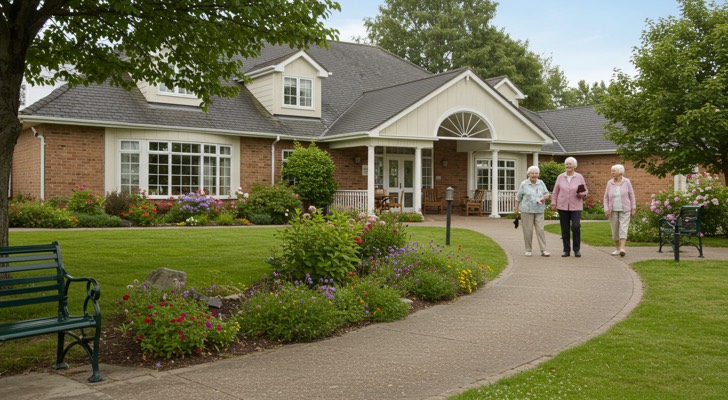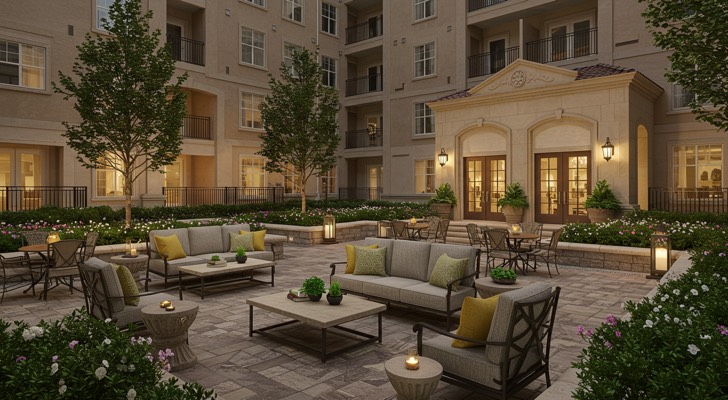As more older adults seek a secure and enriching lifestyle in their later years, retirement villages have become an increasingly popular option across the UK. These purpose-built communities offer a balance of independence, social engagement, and access to support, making them an attractive choice for retirees. However, understanding the costs involved is essential to making a well-informed decision.

What Are Retirement Villages?
Retirement villages in the UK are specially designed residential communities for people typically aged 55 and over. They offer a range of accommodation types, including flats, bungalows, and cottages. Many villages include communal facilities such as lounges, gardens, fitness rooms, and cafes, along with a wide programme of activities and social events.
These communities are designed to help residents enjoy an independent lifestyle while also providing optional services like housekeeping, personal care, meals, and transportation. Some retirement villages also include on-site nursing or domiciliary care services, making them suitable for those who may need more support as they age.
Cost of Living in Retirement Villages
The cost of living in a retirement village in the UK varies depending on location, property size, amenities, and the level of services provided.
Many retirement villages offer homes for sale on a leasehold basis, though some may provide rental options. Prices vary widely. In less expensive areas, homes may start around £150,000, while high-end properties in popular regions can exceed £500,000.
Residents typically pay a monthly fee to cover maintenance of communal areas, security, staff wages, and use of facilities. These charges usually range from £300 to £800 per month but can be higher in luxury villages with extensive amenities.
Additional services such as personal care, domestic help, meal delivery, and medical support are usually charged separately. These can add £500 to £2,000 or more per month, depending on the level and frequency of support needed.
Some villages charge an exit fee (also known as a deferred management fee) when the property is sold, often as a percentage of the sale price. Ground rent may also apply in leasehold properties.
Financial Considerations and Legal Agreements
Before moving into a retirement village, it’s important to fully understand the terms of the lease or occupancy agreement. In the UK, many retirement village operators use leasehold models with additional fees, including deferred management fees and service charges.
You should check how service charges are calculated and whether they can increase. Be sure to understand the terms of any deferred fees payable when leaving the village. Also, clarify ownership rights and resale processes. It’s strongly advised to seek independent legal and financial advice before signing any contracts.
How to Find Retirement Villages Near You
To explore retirement villages in your area, websites such as HousingCare.org, Retirement Villages Group, and Inspired Villages offer searchable listings of developments across the UK. Estate agents specialising in retirement living can also help you find suitable properties.
Your local council or Age UK can also provide guidance and referrals to reputable providers. In addition, online reviews, community forums, and social media groups often include insights from current residents and families that can help guide your decision.
Benefits of Retirement Villages
Retirement villages offer a safe, sociable, and supportive environment for older adults. Benefits include:
- Reduced isolation through regular social activities and communal spaces
- Purpose-built, accessible homes with safety features
- Access to care and support services without needing to move again
- Low-maintenance living with staff handling repairs and groundskeeping
- Security features such as emergency call systems and on-site personnel
For many retirees, these villages offer peace of mind and an improved quality of life.
Choosing the Right Retirement Village
Selecting the right retirement village involves more than comparing prices. You should consider location and proximity to friends, family, and healthcare services, along with the availability of desired amenities and social activities. Look into the flexibility of care and support services, and evaluate long-term affordability and clarity of financial obligations. It’s helpful to visit several villages, speak with staff and residents, and take time to review all documentation carefully.
Conclusion
Retirement villages in the UK offer an appealing combination of independence, community, and support. While the lifestyle is attractive, it comes with varying financial commitments including property costs, service charges, and care fees. By researching thoroughly, seeking expert advice, and considering your current and future needs, you can find a retirement village that suits your lifestyle and offers real peace of mind.
 © Copyright 2025 Shirabe-ru | Terms | Privacy Policy | Contact Us
© Copyright 2025 Shirabe-ru | Terms | Privacy Policy | Contact Us



